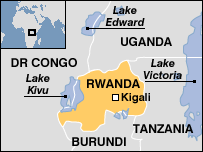
My disseration on Rwanda and British Foreign Policy has just been completed. An odd topic some might think since did Britain actually play any role in that crisis? The answer is yes in that they stayed inactive themselves in the fact of many warnings and also influenced UN policy to remain similarly inactive. I deliberately tried not to go around blaming everyone in the thesis but rather analysed the constraints and incentives that impact British Foreign Policy when they are deciding how to respond to such crises. I particularly compared Rwanda to Darfur today to see if anything has changed. Here are some of the points:
Political: Britain won't intervene unilaterally with troops unless there are substancial national interests involved, pressure from Parliament, sufficient political will (at home and abroad), and the support of the US and other allies.
Military: Britain will not commit troops to Africa but prefers to rely on regional troops to sort things out (yet it not forthcoming with the money to equip and train them).
Ethical: Britain claims to follow an ethical line in upholding conventions such as the Genocide Convention of 1948 and other norms of international law such as sovereignty and the responsibility to protect. In reality this is merely a justification for whatever Britain decides to do. They make the ethics fit their action as necessary.
Awareness & Knowledge: An increase in both of these help keep the government accountable via the media and general public. No government can be expected to intervene without the facts. However enough facts can be there but ignored, misinterpreted etc etc
RWANDA - Britain didn't care enough to send any troops or money or to press any one else to do the same. In fact they obstructed UN efforts in this regard. From very early on in the genocide they knew enough to realised it's nature but because it wasn't in their sphere of influence, the Americans weren't fussed and as they had higher commitments in Bosnia, it was left alone. The British have been accused of being racist towards Rwandas but this doesn't really hold much water.
DARFUR - same is happening again as in Rwanda but with a few differences. Firstly there is no denial of what is happening in Darfur as there was in Rwanda. Secondly the numbers of people killed are lower. Thirdly Britain has pledged more money but only in keeping with its interests there (oil). Action is slow - the crisis has been going on 3 years and still no UN force has gone in. Britain is not giving troops due to being overstretched with Iraq but backs the AU
Conclusion - the same constraints and incentives are at work on British Foreign Policy today as they were in 1994. A very hard and realistic line I know, but its the truth. Nations are conservative beasts and do the least possible on most occasions. The only way they would do more is if they were pressurised into it by lobby groups or things went so wrong that they had to commit more to save face. Lets hope something like that happens to help the people of Darfur.
No comments:
Post a Comment